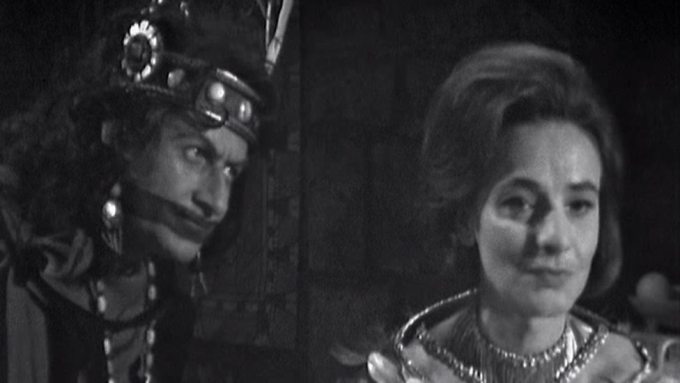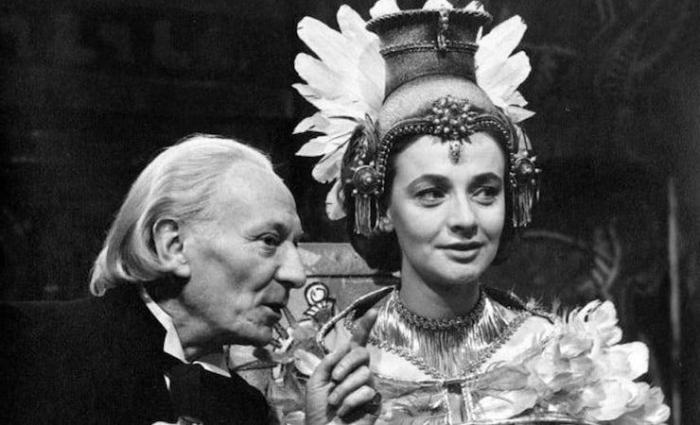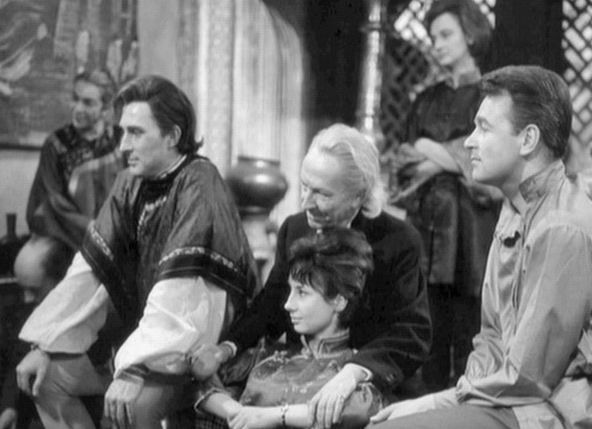History continues to proceed in an inexorable fashion, with Steven and the Doctor caught in its flow. To begin with though, Steven is convinced that the Doctor is dead – so his sudden reappearance comes as something of a shock.
He doesn’t explain where he’s been, only mentioning that he was unavoidably delayed. This is something of a plot-flaw – bad enough that the Doctor decided to head off on his own, but it’s even worse that he now swans back without a care in the world.
It’s only when he realises the date and the year that it suddenly becomes clear to him just how much trouble they’re in (and also for those at home with a decent knowledge of French history). Was it assumed that the audience watching in 1966 would have been easily able to put two and two together? If so it implies that the (largely) child viewership must have been very historically literate.
The Doctor is keen to pack Anne off as soon as possible, but the girl has nowhere to go.
DOCTOR: Now, my dear, there must be somewhere you can stay in Paris.
ANNE: No, there’s only my aunt’s place, and they’ll kill me there.
DOCTOR: Oh, nonsense. Tonight, you will be quite safe. Now you go carefully through the streets, hmm?
And that’s the last we see of her. When Steven later learns that thousands of Hugenots were massacred that day he’s convinced that she too must have died and that the Doctor was culpable. “You just sent her back to her aunt’s house where the guards were waiting to catch her. I tell you this much, Doctor, wherever this machine of yours lands next I’m getting off. If your researches have so little regard for human life then I want no part.”
Could the Doctor have saved her? Of course and they could all have left in the TARDIS together. We’ve seen the Doctor pluck people from many different periods of history, so it’s hard to see why Anne would have been any different. Indeed, it’s possible to believe earlier in the story that she was being groomed as possible companion material, but the events of The Daleks Master Plan should have taught us to take nothing for granted ….
If Hartnell’s been taking it easy for the last few weeks, then this episode gives him one of his signature moments. After Steven storms out of the TARDIS, the Doctor is left all alone. “Even after all this time he cannot understand. I dare not change the course of history. Well, at least I taught him to take some precautions. He did remember to look at the scanner before he opened the doors. Now they’re all gone. All gone. None of them could understand. Not even my little Susan, or Vicki. Yes. And there’s Barbara and Chatterton… Chesterton! They were all too impatient to get back to their own time. And now Steven. Perhaps I should go home, back to my own planet. But I can’t. I can’t”
It’s a lovely moment, although given Hartnell’s reluctance to learn lengthy speeches it can’t have been easy for him. Interesting that the Doctor here still seems wedded to the S1 concept of not interfering in history. This ties in with Lucarotti’s previous stories (notably The Aztecs) but the series, notably under the influence of Dennis Spooner, had somewhat moved on since then.
What’s disappointing is the way that the power of this scene is negated by what happens next. A young girl, Dodo Chaplet (Jackie Lane) bursts into the TARDIS, followed by Steven, and the Doctor is forced to take off immediately. This therefore not only cancels out Steven’s anger with the Doctor, it also provides us with the most perfunctory introduction possible for Dodo, the new companion.
That the Doctor tries to pour oil on troubled waters by pointing out that Dodo’s surname is similar to Anne’s, which maybe suggests than Anne survived after all, feels like little more than an exercise in straw-clutching.
This whole section seems rather bolted on (and was surely contributed by Donald Tosh, rather than John Lucarotti). But even allowing for the way that The Massacre rather dribbles to a halt, the bulk of the story is so strong that this isn’t really an issue.
It might not always feel like Doctor Who, but it’s still excellent drama. Let’s close with a line from Tavannes, a chilling proclamation that sums up the serial perfectly. “Tomorrow this city will weep tears of blood.”























